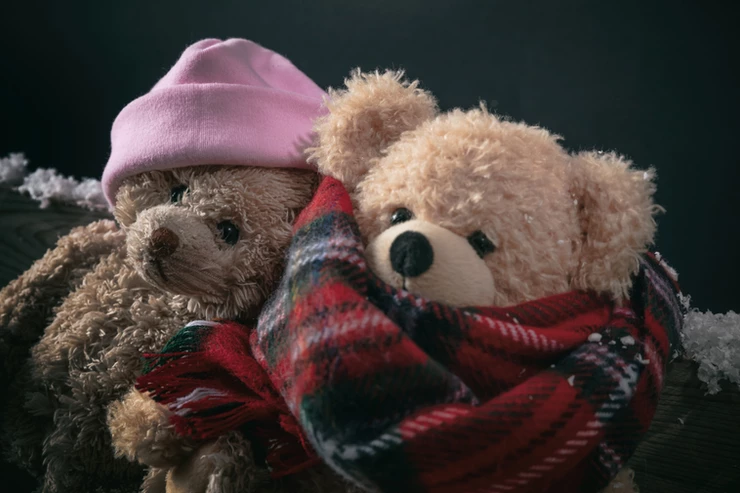HEALTH AND WELLNESS NEWS FROM SENIOR HEALTHCARE ADVISORS
Most of us feel the cold of the winter every now and then. But, did you know that being very cold can make you really sick?
Seniors lose body heat much faster than they did in their younger days. Changes that accompany aging can also make it harder for you to notice if you’re getting cold. Catching a chill can turn into a serious issue before you even know it’s happening. This serious issue is called hypothermia.

What Is Hypothermia?
Hypothermia happens to seniors if their body temperature drops below 95°F, and can cause serious health issues, such as liver damage, heart attack, kidney problems, or worse.
Going outside when it’s cold, or being in a very cold home, can lead to hypothermia. Do your best to pay attention to how cold the temperature is wherever you are. Try to avoid being in a cold place for very long. The next sections are some helpful hints to lower your risk of getting hypothermia.
Keep Warm Inside
Living in a cold apartment, house, or other type of building can cause hypothermia. For those in assisted living facilities or nursing homes, sometimes the rooms are too cold. If you know someone living in a group environment, pay close attention to what the inside temperature is and whether your loved one is dressed warmly enough.
Seniors with illnesses may be specially inclined to have problems keeping warm. You don’t have to wait until it is too cold in your home to dress warmly. Even if you keep your home at or around 65°F, it may not be warm enough to stay safe. If you are living alone, this is a special issue, because no one is there, but you, to notice the cold, or notice if you are showing symptoms of hypothermia.
Tips for Staying Warm Indoors
- Keep your heat on at least 70°F. You can save money on your heating bill by closing off any rooms not in use. Shut the doors and close the vents in these rooms, and keep the basement door closed. Roll up towels, and put it at the feet of all doors to keep the drafts out.
- Check to make sure your home is not letting the heat escape through windows. Keep your curtains and blinds closed. If you notice gaps around your windows, caulk or apply weather strips to prevent cold air from coming in.
- On cold days, dress warmly even if you are staying home. Keep a throw blanket handy to drape over your legs. Wear slippers and socks.
- At nighttime, pull out your long underwear to have on under your pjs, and keep extra blankets on the bed. You can also wear a nightcap.
- Make sure you are keeping your weight up by eating enough food. If you are not eating right, you won’t have the protection of fat under your skin to keep you warm.
- Watch your alcohol intake, or don’t even drink any during the winter. Beverages containing alcohol makes your body lose heat.
- Have your family members or friends do welfare checks on you during cold weather if you live alone.
- Don’t try to stay home during a power outage. Try to stay with a friend or relative.
***Important*** Space heaters are tempting for keeping your room warm, however, some are fire hazards, and some emit dangerous carbon monoxide. Here is a link to learn about safely using space heaters:
Bundle Up on Cold Windy Days
Cold wind quickly lowers your body temperature. Keep an eye on the weather forecast for cold and windy days. Try to stay at home or in a warm place on those days. If you are going outside, be sure to dress in warm clothes, and don’t stay out in the wind or cold for a long period of time.
Other helpful tips:
- Dress according to the weather when going out on cold, chilly, or damp days.
- Wear layers of clothing.
- Wear a scarf or hat. A lot of body heat is lost through your head and neck when they are uncovered.
- Make sure to have a waterproof jacket or coat on damp and snowy days.
- If your clothes get the slightest bit damp, change them right away.
Medicines, Illness, and Cold Weather
Some health conditions can make it more difficult for your body to keep warm.
- Thyroid problems can make it difficult for your body to maintain a normal temperature.
- Diabetes can prevent normal blood flow that provides warmth.
- Arthritis and Parkinson’s disease can make it difficult to change clothes or put on more clothes. Take care by using blankets and staying out of the cold.
- People with memory problems can go outside in the cold without the right clothing. If you know someone struggling with dementia, Alzheimer’s disease, or other memory deficits, keep a close check on their body temperature, appropriate clothing wear for cold days, etc.
- Discuss with your physician how to prevent hypothermia and ask if your health conditions make you more vulnerable to cold weather.
- Some medications can affect loss of body heat, especially if you are not active. Some over-the-counter medication, such as cold remedies, can affect loss of body heat. Go over all your medicines with your doctor and never stop taking medication without your doctor’s approval.
Topics to Discuss with your Doctor about Cold Weather
- What are the signs of hypothermia?
- Do my health conditions or medicines make me more vulnerable to hypothermia?
- What are some safe activities I can do to stay active while inside?
Click here for up-to-date health news: https://seniorhealthcareadv.com/blog


